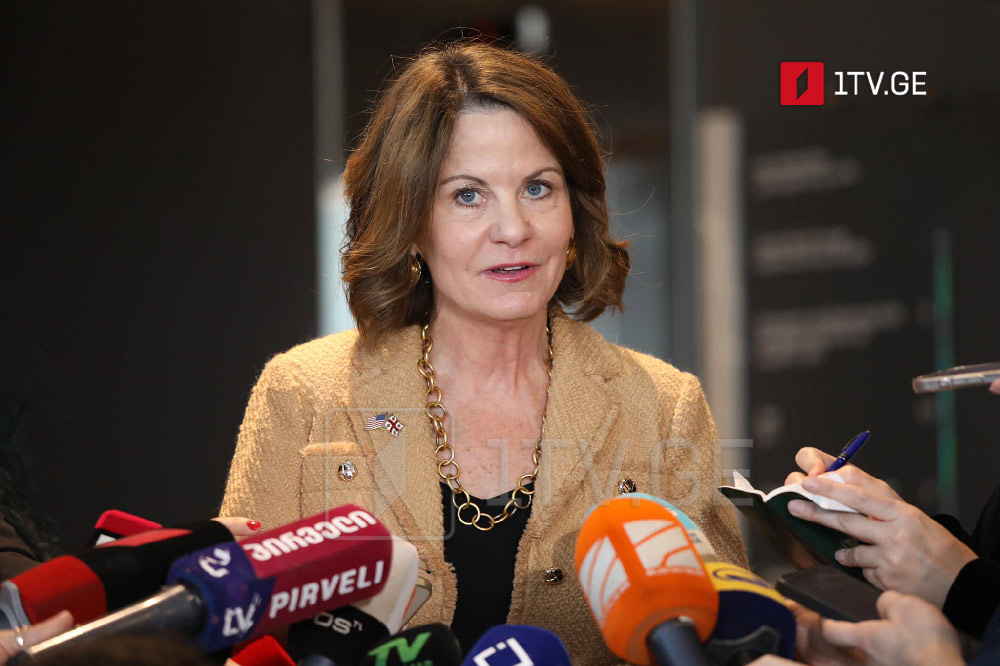
“Disinformation is occurring about what it means to become a member of the European Union. One threat of disinformation is that it means that you give up your identity, which is completely false,” said US Ambassador to Georgia, Robin Dunnigan at the presentation of the Soviet Memory project at the Ilia State University.
According to the Ambassador, unfortunately, there’s disinformation today about the relationship of the United States with Georgia.
“We do have, we are overwhelmed by and under-equipped to deal with the disinformation that plagues us today. And unfortunately, it’s happening here in Georgia. Disinformation is occurring about what it means to become a member of the European Union. One threat of disinformation is that it means that you give up your identity, which is completely false. All you have to do is drive through the EU and cross the border, and you know, when you go from Austria to Italy, there is no question that you keep your cultural identity.
So one aspect of disinformation, unfortunately, there’s disinformation today about the United States relationship with Georgia. There are some who claim that we are a global war party or that we have tried to foment revolution in this country, or that we have nefarious intentions here. And truly, it’s heart-breaking to hear this because as the chancellor and rector both spoke about, our history in this country over 32 years is a history of strong people-to-people ties, deep friendships between Americans and Georgians, and partnerships in the medical field, in the education field, in sharing agriculture techniques, helping each other, strengthen our defense forces.
Over 32 years, we’ve provided $6 billion of assistance to Georgia. It’s not really that number doesn’t really tell the story though. What tells the story is, actually chancellor, what you said it’s years and years of working together with individual universities, and different organizations to help build the partnership that we share today. So, it is heart-breaking and disappointing to hear a narrative that tries to paint a different picture than what we know is true.
So I want to reiterate today, the United States commitment to the Georgian people, to the Georgian people’s aspirations to become a member of the EU, to strengthen the Euro-Atlantic trajectory. It’s a future that’s in Georgia’s constitution. It’s a future that we’ve all been working hard together for, for decades. And it’s a future that the United States will continue to support in every way that we can,” she said.
The Ambassador remarked that the US is proud of contributing to the fight against disinformation.
“Disinformation, historical revisionism is really and truly a threat to democracy is everywhere. We see it here. We see it in Europe, we see it in the United States. So this initiative, which we are very happy to fund, and we’re proud to fund and contribute to, it really seeks to counter disinformation. It seeks to counter Russian disinformation. Russian historical revisionism, and tell the truth about history, about what happened. The true narrative about Georgia’s history and it’s experience under Russian rule. The projects, components from a civic education series to exhibitions and documentaries, what it tries to do is preserve the truth. It serves as a reminder to everyone that the Soviet regime here routinely called Georgians, who tried to tell the truth, agents or foreign agents.
Investing in projects like this helps us ground our current experience in a real telling of what happened in the past. It’s also about honoring the voices of those who experienced this past, the oral histories that are documented here, they’re real voices and stories of Georgians who lived through a brutal Soviet regime. And it’s really incredible that they took the time to relive some of what they experienced. So that this history would never be forgotten or repeated. So by capturing their experiences, we ensure that future generations understand the true traumas that happened in the past and the resilience that Georgia showed, and really contributed to Georgia’s identity today. I am relatively new in Georgia. I’ve been here eight months now. And I think the overwhelming characteristic that has impressed me about Georgia is the resilience and this unique cultural heritage, language, food, wine culture that Georgians have, and that they have kept despite all of the challenges of the neighborhood and the history,” she said.





